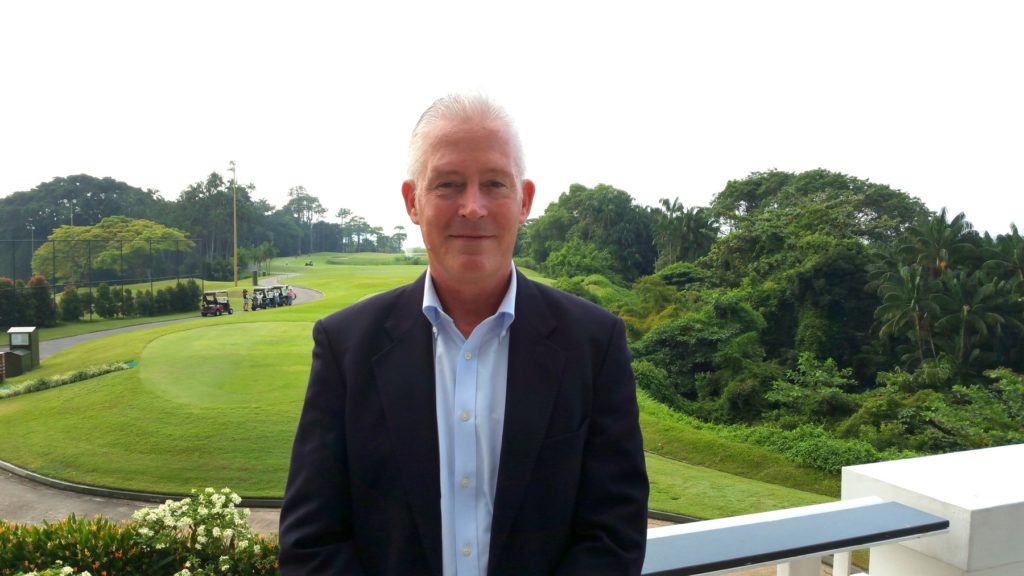
Reliable and consolidated data is one of the keys to safeguarding the future of golf clubs in Singapore and around Asia. That is the view of Eric Lynge, Chief Executive Officer of the Asian Golf Industry Federation (AGIF), the region’s umbrella golfing body.
Speaking at a Club Management Mini Summit at Sentosa Golf Club, Lynge said the AGIF – a non-profit organisation – is planning to take the lead in aggregating information that will be persuasive in outlining why golf courses are a force for good.
Currently, though, the mood within the golf industry in Singapore is bleak in the wake of the closure of Jurong Country Club at the end of 2016 and the recent announcement that the 36 holes at Raffles Country Club are to be shut down this year. The Keppel Club has also been advised that its lease will not be extended.
A further two establishments – Marina Bay Golf Course and Orchid Country Club – are slated to close in four and 14 years respectively and relocate to existing courses at Singapore Island Country Club.
Lynge said the closures were not due to a shortage of golfers or unprofitable business models.
He said: “Singapore is home to one of the most cash-rich clubs in the world and other clubs are relatively healthy financially and membership wise.
“However, this does not stop the speculation. Recent opinion columns in Singapore contend that the average age of club members is 60 years old and that most clubs are unprofitable. Those of us in the industry know that this is not true.
“What is true is that around 10,000 memberships will expire with some compensation but no place to transfer. This affects not only golfers but the substantial membership population which used the other facilities at the golf club. What is also true is that between 300 to 400 full-time jobs for mostly Singaporean workers are being lost.”
Lynge said that if this happened in another industry there would be an uproar, or at least some debate.
He added: “However, at this stage the golf industry is just accepting its fate fairly quietly. Of course, infrastructure projects are needed and there is no country with a better track record than Singapore on this practice.
“But those of us in the industry should question and study why golf courses were viewed as more dispensable than other properties. One obvious factor is that there is no consolidated data which gives the industry a clear idea where it stands as a body.
“How can we prove that golfers are much younger than the perception? How can we outline how many Singaporeans rely upon the golf club industry for their livelihood? How can we prove that participation is increasing or decreasing? We can only answer these questions with data.
 “It is clear that the industry would benefit by getting together like other industries to start benchmarking all pertinent elements to golf and club environment. Knowledge is power. Once consolidated, I think that Singapore will have a pretty healthy lobby.
“It is clear that the industry would benefit by getting together like other industries to start benchmarking all pertinent elements to golf and club environment. Knowledge is power. Once consolidated, I think that Singapore will have a pretty healthy lobby.
“When you look at it, Singapore has a very high level of facilities and participation per capita in club life, not only golf clubs, but university clubs like NUSS, Armed Forces clubs like SAFRA and NSRCC, and union clubs like NTUC community clubs. This is the opportunity, not only for the club industry in Singapore but the rest of Asia as well.
“To that end, the AGIF is in active discussion with organisations like the National Golf Foundation in the United States, which for years has tracked all data about golf in the US market.
“They are very happy to work with us in Asia to extend tried and trusted statistical methodology and standard uniform benchmarking so that over time we will have not only country specific data but comparative and cumulative Asian data.”
Patrick Bowers, Chief Executive Officer and Managing Director, Laguna Hospitality, said: “Those of us within the industry know and understand anecdotally the financial and employment benefits which the industry contributes. However, without the proper verified data, it is difficult for us to advocate on behalf of employees and members with any certainty.
“Collectively the golf industry in Singapore employs thousands of people at both junior and senior levels, generates significant tax revenues, provides a strong basis for doing business internationally not to mention the physical benefits of exercising outdoors and being a game which the older generation can play well into their retirement.”
Kok Min Yee, General Manager at Tanah Merah Country Club, said: “It is very timely that the Asian Golf Industry Federation is taking the lead in gathering data on the golf industry, not only as a useful resource for golf clubs to benchmark and manage their operations, but also for the entire golf industry given the current headwinds faced.”
Asian Golf Industry Federation www.agif.asia

